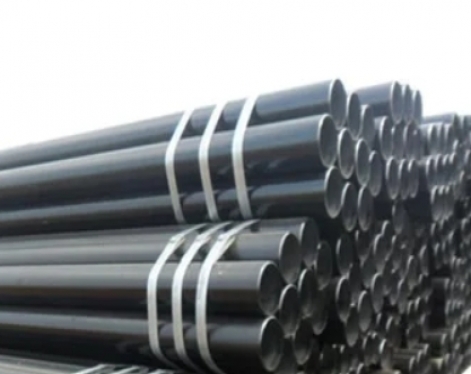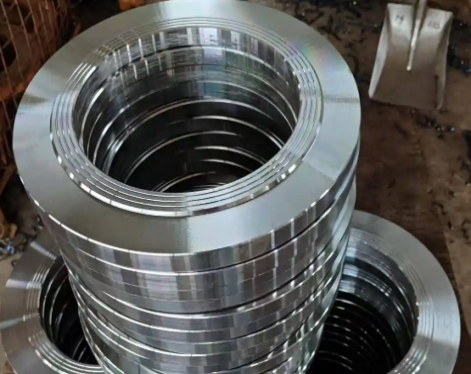ERW pipe, or Electric Resistance Welding Pipe, is a steel pipe that is made by forming the hot-rolled coil through a forming machine, using the skin effect and proximity effect of high-frequency current to heat and melt the edge of the pipe, and then performing pressure welding under the action of extrusion rollers. Different from ordinary welded pipes, the weld of ERW pipes is formed by melting the base material of the steel strip body, which has higher mechanical strength.
Advantages of erw pipe
1. High Strength: ERW pipes are made of high-strength steel, which gives them high load-bearing capacity and durability, and can withstand greater pressure and vibration.
2. Wide range of applications: ERW pipes can be seen in fields ranging from oil and gas pipelines to building structures, chemical pipelines, and machinery manufacturing.
3. Easy to process: Due to the hot rolling process, the steel structure is uniform, which makes the ERW pipe easy to cut, bend and weld, facilitating the processing process.
4. High cost performance: Its price is relatively low, while it can meet various engineering needs, and has a high cost performance.
5. High weld quality: Modern production technology enables the weld quality of ERW pipes to be effectively controlled, the weld reliability is high, and it can meet higher quality standards.
6. High dimensional accuracy: The production process includes sizing, straightening and other processes to ensure the high geometric dimensional accuracy of the ERW pipe.
7. Uniform wall thickness: Generally, the uniformity of wall thickness can be controlled at around ±0.2mm, ensuring the performance consistency of the pipeline at all locations during use.
8. Good surface quality: Its surface is smooth, flat and beautiful, without the need for excessive surface treatment processes, reducing processing costs and time.
Disadvantages of ERW pipe
1. Poor corrosion resistance: The surface treatment is relatively simple and the corrosion resistance is relatively poor.
2. Limited pressure resistance: The pressure resistance is relatively low, and its application in special environments such as high pressure and high temperature is relatively limited.
3. Large bending radius: Not suitable for situations that require a smaller bending radius.
4. Welding performance is average: The welding performance is relatively average, and appropriate welding processes and techniques need to be adopted, otherwise welding defects may occur, affecting the overall performance of the pipeline.
5. Weld defects are prone to occur: Although the quality of welds is constantly improving, there is still a risk of defects such as gray spots, lack of fusion, and groove corrosion at the welds, which may reduce the safety and reliability of the pipeline.

Choosing the right ERW steel pipe/tube for your industrial application can be a daunting task as there are many factors to consider. Here are some key factors to consider when choosing the right ERW pipe for your industrial application:
1. Material
ERW pipes are available in stainless steel, carbon steel, alloy steel and other materials. The material you choose will depend on the specific application and the environment in which it will be used. For example, if the pipe will be used in a corrosive environment, you may want to choose stainless steel pipe because it has the greatest resistance to corrosion. If the budget is insufficient, you can also choose carbon steel pipes. Painting or galvanizing the surface of the pipes can effectively prevent carbon steel from oxidizing and rusting. If it is a particularly harsh working condition, you can choose to thermally spray a layer of carbide on the surface.
2. Size
ERW pipes are available in different sizes and dimensions. The size you choose depends on the specific application and the required flow or pressure. It is important to choose the right pipe size to ensure proper flow and avoid any blockage or pressure drop.
3. Wall thickness
ERW pipe comes in different wall thicknesses, which affects its strength and durability. The wall thickness you choose will depend on the specific application and the amount of pressure or stress the pipe will be subjected to. Thicker wall pipes are better suited for high pressure applications.
4. Strength
According to the load and usage conditions of the project, select the appropriate material to meet the strength requirements.
5. Temperature
Choose the appropriate material according to the ambient temperature of use. Some materials have good stability and heat resistance at high temperatures and are suitable for high temperature environments.
6. Pipe end finish
ERW pipe ends are available in different end finishes such as plain end, beveled end, and threaded end. The end finish you choose depends on the specific application and the type of connection required.
7. Standard Certifications
It is important to select ERW pipes that have the appropriate certifications and meet the standards required for your application. For example, if you use pipes in the oil and gas industry, you may need pipes that meet API 5L standards.
8. Cost
Finally, the cost of ERW pipes is also an important factor to consider. The costs of different materials vary greatly. While it’s important to choose pipes that meet the specifications you need, it’s also important to choose pipes that fit your budget.
Read more: Advantages of ERW Pipes in the Construction Field
Advantages of erw pipe
1. High Strength: ERW pipes are made of high-strength steel, which gives them high load-bearing capacity and durability, and can withstand greater pressure and vibration.
2. Wide range of applications: ERW pipes can be seen in fields ranging from oil and gas pipelines to building structures, chemical pipelines, and machinery manufacturing.
3. Easy to process: Due to the hot rolling process, the steel structure is uniform, which makes the ERW pipe easy to cut, bend and weld, facilitating the processing process.
4. High cost performance: Its price is relatively low, while it can meet various engineering needs, and has a high cost performance.
5. High weld quality: Modern production technology enables the weld quality of ERW pipes to be effectively controlled, the weld reliability is high, and it can meet higher quality standards.
6. High dimensional accuracy: The production process includes sizing, straightening and other processes to ensure the high geometric dimensional accuracy of the ERW pipe.
7. Uniform wall thickness: Generally, the uniformity of wall thickness can be controlled at around ±0.2mm, ensuring the performance consistency of the pipeline at all locations during use.
8. Good surface quality: Its surface is smooth, flat and beautiful, without the need for excessive surface treatment processes, reducing processing costs and time.
Disadvantages of ERW pipe
1. Poor corrosion resistance: The surface treatment is relatively simple and the corrosion resistance is relatively poor.
2. Limited pressure resistance: The pressure resistance is relatively low, and its application in special environments such as high pressure and high temperature is relatively limited.
3. Large bending radius: Not suitable for situations that require a smaller bending radius.
4. Welding performance is average: The welding performance is relatively average, and appropriate welding processes and techniques need to be adopted, otherwise welding defects may occur, affecting the overall performance of the pipeline.
5. Weld defects are prone to occur: Although the quality of welds is constantly improving, there is still a risk of defects such as gray spots, lack of fusion, and groove corrosion at the welds, which may reduce the safety and reliability of the pipeline.

Choosing the right ERW steel pipe/tube for your industrial application can be a daunting task as there are many factors to consider. Here are some key factors to consider when choosing the right ERW pipe for your industrial application:
1. Material
ERW pipes are available in stainless steel, carbon steel, alloy steel and other materials. The material you choose will depend on the specific application and the environment in which it will be used. For example, if the pipe will be used in a corrosive environment, you may want to choose stainless steel pipe because it has the greatest resistance to corrosion. If the budget is insufficient, you can also choose carbon steel pipes. Painting or galvanizing the surface of the pipes can effectively prevent carbon steel from oxidizing and rusting. If it is a particularly harsh working condition, you can choose to thermally spray a layer of carbide on the surface.
2. Size
ERW pipes are available in different sizes and dimensions. The size you choose depends on the specific application and the required flow or pressure. It is important to choose the right pipe size to ensure proper flow and avoid any blockage or pressure drop.
3. Wall thickness
ERW pipe comes in different wall thicknesses, which affects its strength and durability. The wall thickness you choose will depend on the specific application and the amount of pressure or stress the pipe will be subjected to. Thicker wall pipes are better suited for high pressure applications.
4. Strength
According to the load and usage conditions of the project, select the appropriate material to meet the strength requirements.
5. Temperature
Choose the appropriate material according to the ambient temperature of use. Some materials have good stability and heat resistance at high temperatures and are suitable for high temperature environments.
6. Pipe end finish
ERW pipe ends are available in different end finishes such as plain end, beveled end, and threaded end. The end finish you choose depends on the specific application and the type of connection required.
7. Standard Certifications
It is important to select ERW pipes that have the appropriate certifications and meet the standards required for your application. For example, if you use pipes in the oil and gas industry, you may need pipes that meet API 5L standards.
8. Cost
Finally, the cost of ERW pipes is also an important factor to consider. The costs of different materials vary greatly. While it’s important to choose pipes that meet the specifications you need, it’s also important to choose pipes that fit your budget.
Read more: Advantages of ERW Pipes in the Construction Field









